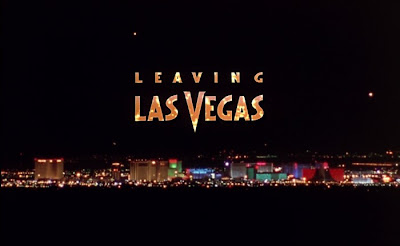"...Or maybe killing myself is a way of drinking"
This is a portrait of a man who has far surpassed the point of help, unlike other films regarding alcoholics, such as Crazy Heart or Tender Mercies (both great films). Ben Sanderson (Nicholas Cage, in a role rightfully earning him the Oscar for Best Actor) is a screenwriter working in Los Angeles. As the film opens, Ben is already a full-blown, no-going-back alcoholic. It costs him his job. His friends turn him away. His wife has already left him. These early scenes in Los Angeles are heart-breaking as soon as we (very) quickly realize how far Ben has descended into alcoholism. After he loses his job, he then decides to go to Las Vegas, and drink himself to death. This is his goal.
His first encounter with Sera (played by Elisabeth Shue in a miraculous and tender performance) is on the Las Vegas strip, when he nearly hits her as she crosses the street. He's driving drunk. He's always driving drunk. That stands to reason. He's always drunk. His second encounter with Sera is on the same street, the next day, where he offers her $500 to go to his room. She agrees.
In the room, Sera proceeds to give Ben oral sex, but he's much too drunk for that business. Or maybe he just isn't interested in it. He just wants to talk to her. And this intrigues Sera, so she indulges.
This is a bleak, sad, depressing film. Or, I should say, the material is depressing. I am never depressed by a great film. But this is a film about people who are genuinely good, both self-destructive (in their own very, very different ways), and develop a rather unspoken bond that hasn't quite existed like this on film before. Sera and Ben's relationship isn't sexual. It's hardly romantic. They are two people - lonely and miserable - who come to care about each other. Even Ben, who is drunk every second of the film, has the ability to reach within himself and show kindess to Sera.
Both Sera and Ben develop a relationship where they need each other. Ben calls Sera his "angel." And after Ben tells Sera that she "can never, ever ask [him] to stop drinking," she quietly replies, "I know." This hurts her. She wants to help him. Eventually, she does urge him to seek help. This enrages him, he brings a prostitute to her house, and she kicks him out.
In a moment of desperation, Sera enters herself into a situation that is absolutely heart-breaking, and this is where she realizes how much she needs Ben. She must stick with him to the end. He is her redemption.
And such is why I believe this is not a story about Ben Sanderson so much as it is about Sera. She is the one capable of change; capable of a choice. Ben, long before meeting Sera, determined his fate. This is a tragedy, but also a beautiful love song. Not one involving sex. Not an ordinary love song. But one nonetheless.
Mike Figgis, writer, director, and composer of the film, has a great attention for detail to the dark, subdued, and often buried sides of human nature. He shot the film on Super 16, often shooting on the Vegas strip with no permit, and usually in one take. He believed this method added to the authenticity of the scene, rather than closing the strip down. I can't disagree with him. Shue and Cage turned in the two best male-female performances of 1995.
At one point, Ben says to Sera "I knock things over all the time, throw up all the time. These past few days I've been very controlled. You're like some sort of antidote that mixes with the liquor and keeps me in balance. But, that won't last forever." But Sera certainly hopes it does.
At one point, Ben says to Sera "I knock things over all the time, throw up all the time. These past few days I've been very controlled. You're like some sort of antidote that mixes with the liquor and keeps me in balance. But, that won't last forever." But Sera certainly hopes it does.
This is the best film of 1995, one of the best of the 90s, and simply, an all around brilliant, well-acted, -directed, and -written piece of art. It could have been one thing. Instead it was the better alternative.




No comments:
Post a Comment